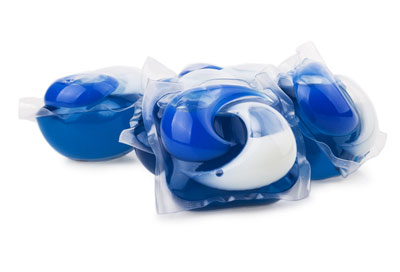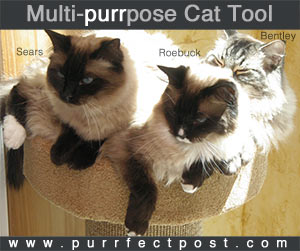The Dangers of Detergent Pods for Cats

Detergent pods are popular items found in today's homes. Used both for washing machines and dishwashers, these colorful plastic pods filled with concentrated detergent make doing laundry and dishes easier and less messy for people.
However, there is a dangerous side to these detergent pods. Curious cats (or dogs or children) may bite into these attractive items, and that is extremely dangerous.
How Are Detergent Pods Dangerous to Cats?
Normally, if a cat were to lick up a small amount of detergent, generally the only negative results to occur would be some mild gastrointestinal upset.
However, detergent pods contain highly concentrated soap, and they are under pressure. When a sharp feline tooth punctures the pod, the pressurized contents shoot out toward the cat's face, usually causing a sharp intake of breath.
The cat may inhale and swallow the concentrated detergent, and it may get into her eyes, as well. Inhaled detergent can result in aspiration pneumonia, which is a serious condition that requires aggressive treatment. Not only could the dog inhale the detergent when it sprays into her face as she bites a pod, but vomiting up swallowed detergent could also result in inhaling it as it comes back up.
Cats, especially kittens, may be attracted to the colorful laundry pods, which may even look like some of their cat toys.
Signs of Detergent Pod Poisoning in Cats
You may not always be aware that your cat has bitten into a detergent pod. Here are some of the signs she may show if she has done so:
- Vomiting
- Diarrhea
- Coughing
- Wheezing
- Foaming at the mouth (you may be able to smell detergent on the cat's breath)
- Lethargy
- Difficulty breathing
- Rubbing frantically at the eyes, mouth, and nose
- Red and draining eyes
Treatment of Detergent Pod Toxicity in Cats
The treatment for detergent pod exposure is to remove as much of the detergent from the cat's fur, face, and mouth as possible. From there, supportive care for gastrointestinal and respiratory problems is required.
Contact your veterinarian or the Pet Poison Hotline at 855-764-7661 right away for further instructions.
If your cat is having trouble breathing, it is an emergency, and you should get her to your regular vet or an emergency vet right away.
Preventing Detergent Pod Poisoning in Cats
The best way to avoid this problem is to be vigilant about keeping detergent pods locked up out of reach of your cat.
You May Also Like These Articles:
Why Do Some Cats Have Two Different Colored Eyes?
How to Be Prepared for Your Cat's Veterinary Bills
Pet Insurance: Peace of Mind for Your Cat's Health
Hypertrophic Cardiomyopathy HCM in cats
How To Know When Your Cat Is Sick
Dehydration in Cats: How Can You Tell If a Cat Is Dehydrated?
Notice: Ask-a-Vet is an affiliated service for those who wish to speak with a veterinary professional about their pet's specific condition. Initially, a bot will ask questions to determine the general nature of your concern. Then, you will be transferred to a human. There is a charge for the service if you choose to connect to a veterinarian. Ask-a-Vet is not manned by the staff or owners of CatHealth.com, and the advice given should not delay or replace a visit to your veterinarian.




